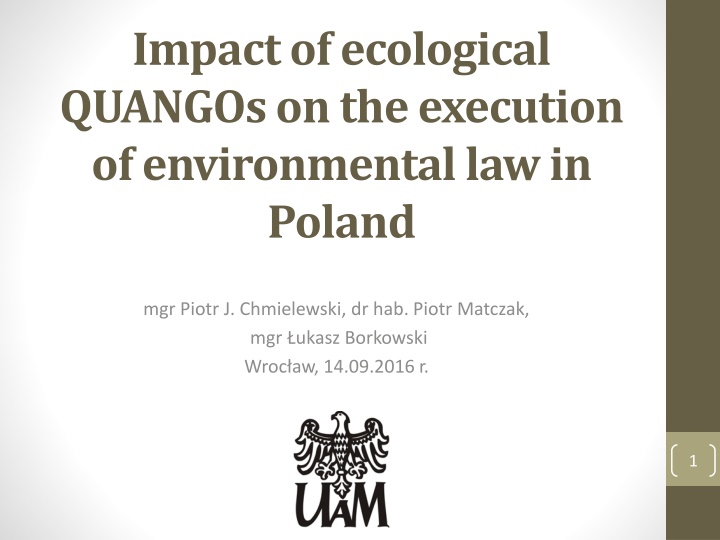
Impact of Ecological QUANGOs on Environmental Law in Poland
Explore the impact of Ecological QUANGOs on the execution of environmental law in Poland, focusing on their role in decision-making processes, participation of NGOs, and mechanisms to address challenges posed by QUANGOs. Key points include research problems, NGO participation, and definitions of QUANGO in legal and social contexts.
Download Presentation

Please find below an Image/Link to download the presentation.
The content on the website is provided AS IS for your information and personal use only. It may not be sold, licensed, or shared on other websites without obtaining consent from the author. If you encounter any issues during the download, it is possible that the publisher has removed the file from their server.
You are allowed to download the files provided on this website for personal or commercial use, subject to the condition that they are used lawfully. All files are the property of their respective owners.
The content on the website is provided AS IS for your information and personal use only. It may not be sold, licensed, or shared on other websites without obtaining consent from the author.
E N D
Presentation Transcript
Impact of ecological QUANGOs on the execution of environmental law in Poland mgr Piotr J. Chmielewski, dr hab. Piotr Matczak, mgr ukasz Borkowski Wroc aw, 14.09.2016 r. 1
Introduction 1. Research problem 2. Participation of NGO in environmental proceedings legal basis 3. Definitions of QUANGO legal and social perspective 4. Ecological QUANGOs as a problem of Polish environmental law 5. Impact of ecological QUANGOs 6. Mechanisms to deter ecological QUANGOs 7. Conclusions 2
Research problem Do ecological Quasi Non-Governmental Organisations (Quangos in sociological meaning) have effect on environmental decisions making environmental law in Poland (especially environmental impact assessment)? and execution of 3
NGO as participant with the party s rights(1) -statutory goals -certain proceedings require public participation, -participate with the party s rights, if they carry out the statutory activities in the field of environmental protection or conservation -12 months before the date of commencement of this proceedings. -the provision of art. 31 4 of the Code of Administrative Procedure shall not apply. 4
NGO as participant with the party s rights(2) -right to appeal against the decision in the proceedings requiring public participation, -even if it did not participate in a specific procedure requiring public participation - an appeal is tantamount to the declaration desire to participate -on appeal, the organization is involved as a party 5
NGO as participant with the party s rights(3) The decision to refuse admission to participate in for the environmental organization can be overrun by the right to appeal. 6
Definitions of QUANGO (1) -first used by Anthony Barker in 1982. Any type of body or organization which is not an incorporated part of government's own structure but which acts as an extension of that government's authority. a central or local 7
Definitions of QUANGO (2) sociological approach Organizations not acting in public interest, secretly lobbying or searching for their private interests, whose actions can delay investments by protesting within a procedure, searching for compensation from investors. 8
Ecological QUANGOS as a problem of Polish environmental law 1. Legal background and the problems of the execution of environmental law. 2. Social perception of ecological Quangos in Poland image analysis on the basis of case studies from Polish daily press. 3. Negative stereotyping of environmental NGOs. 9
Impact of ecological QUANGOs - spoiling the image of the whole image of the non- governmental sector. - reduction of a social trust. - reduction of the willingness environmental NGOs. - contradiction with the principles of civil society. -strenghtening of terms in public opinion: eco-extortion (ekoharacz) i ecoterrotism (ekoterroryzm). to cooperate with 10
Mechanisms to deter ecological QUANGOs 1. Ethical cards of environmental NGOs. 2. Promoting transparency and openness of actions. 3. Integrity and accountability in the management of the organization. 4. Detection and combating unethical and unlawful actions. 11
Conclusions 1. Ecological Quangos have impact on execution of environmental law and social perception of the non- governmental sector. 2. Unlawfull and unethical actions can cause social distrust and unwillingness to co-operate. 3. Legal and sociological measures are needed to combat negative phenomenons as eco-extortions. 12
